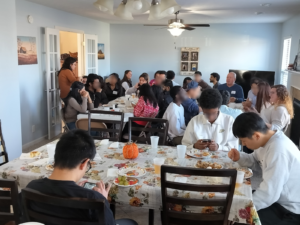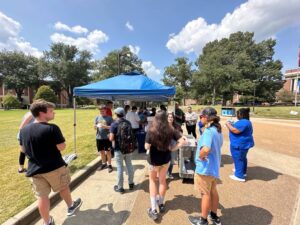We live in an era of constant change. Constant. So much that it is easy to assume that something that came on the radar more than a few years ago would now be hopelessly irrelevant, a “so yesterday.”
That would certainly be true if we’re thinking of fads. Consumer gadgets like Fidget Spinners and social happenings like the Ice Bucket Challenge and Pokémon Go would certainly qualify as having short shelf-lives. Fun and interesting while they’ve got their 15 minutes but not likely to change the world.
Trends are a different matter; they have more staying power and we need to pay attention. The long transition from traditional to more contemporary forms of worship and even a boomerang of sorts back to traditional in some settings is one example. The rise of the Nones and the recent demographic reports on the mindset of Gen Z represent realities that will impact our ministries for years to come. It’s always good to be tracking with those out there who represent the best of culture watchers and learn from their observations and insights. We need to pay attention.
And then there are shifts, like tectonic plates whose movement changes everything. Shifts reflect major changes at the philosophical and foundational level of culture, not predictive and normative change, but transformational change. And the masses often don’t see these shifts until they are well underway.
Back in the 1980s, the New Age was everywhere. This was the era of Ram Dass, channeling, Ramtha, astral projection, fascination with crystals, and Harmonic Convergence Day. (I’ve actually been to the Harmonic Convergence site near Sedona, and yes, the stones are still piled up!) Much of this was faddish, for sure, and passed into irrelevance. But it would be a mistake to think that because we don’t see or hear the words “New Age” the way we used to that it’s gone away. Rather, we don’t hear so much about it these days because the primary teachings of the New Age Movement have become mainstream, they’ve permeated culture. All you have to do is look with discerning eyes and you’ll see confirmation of this everywhere. A shift in the ways people understand spiritual reality.
Likewise, in the early 2000s, Postmodernism showed up on the radar of practically every reading list, conference theme, and coffee house conversation. Like New Age, you don’t see the word “postmodernism” show up as often, but we would be seriously mistaken to think that it’s a fad or trend that has passed. Today, postmodernism is the air our culture breathes, the water in which it swims. Author Stephen Garber calls PM “the culture of whatever,” and those of us who work with students see this on a daily basis.
The late Phyllis Tickle wrote that every 500 years the church has a rummage sale and cleans out of forms of spirituality and replaces them with new ones. The Reformation in the 16th century was the latest one, a huge shift in the way the church understood itself and engaged with culture. Tickle said that the transition from the age of Modernism to Postmodernism that has been taking place over our lifetime represents the latest such rummage sale. We need to pay attention.
Last year, I was going over some files and revisited two documents that showed up in the early 2000s that signaled the shift that was upon us. These were “You can’t unsee this!” principles for me that became part of my missional DNA. The first, Reggie McNeal’s “Six Present-Futures,” pointed to new realities in the way the church understood itself and its mission: (1) The collapse of the church culture; (2) the shift from church growth to Kingdom growth; (3) a new Reformation: releasing God’s people for mission; (4) the return to spiritual formation; (5) the emergence and development of new apostolic leadership; and (6) the development of missional partnerships and alliances.
Reggie laid all this out in the late ‘90s and was right on target. Every one of these has become part of the discussion and mission strategy for the church today. Still highly relevant.
The second was an interview with Rick Richardson in an issue of The Ivy Jungle Report, in which he articulated Five Cultural Shifts we need to understand in order to effectively share the gospel today: Trust before Truth, Experience before Explanation, Belonging before Believing, Identification before Influence, and Image before Word. Everyone familiar with these five cultural shifts knows they are now encoded into how we do our work. Still highly relevant.
And although these men wrote about these changes almost 20 years ago, they are still highly relevant because they were describing not fads or trends, but shifts, outcomes of the current 500-year rummage sale. And these aren’t going away. As the popular TV show declares, “This Is Us.”
Why is this important? As campus ministers, we have a front-row seat to changes taking place in our larger culture. Our primary task is to engage students with the gospel and prepare young Jesus followers to engage the culture they will be entering as adults in a way that they can best represent Jesus and impact the culture for the Kingdom. We can do that better if we take time to think deeply, reflect thoughtfully, and pray faithfully on these cultural realities, filtered through scripture, so we can steer our students toward the things that really matter.
By the way (shameless plug alert!), I’ll be leading a breakout at the National Collegiate Summit in Nashville this May on “Essential Reading for Collegiate Ministers.” I’ll be sharing resources that can help in this effort. And in the meantime, I’ll be glad to share PDFs of Reggie’s and Rick’s teachings and would love to hear your feedback. E-mail me at [email protected].
Robert Turner is the Emerging Regions Collegiate Consultant and Collegiate Team Leader in Pennsylvania/South Jersey.






